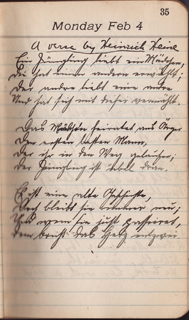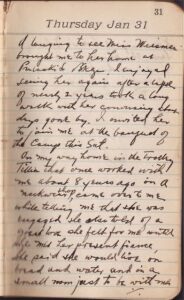
A verse by Heinrich Heine
Ein Jüngling liebt ein Mädchen,
Die hat einen andern erwahlt;
Der andre leibt eine andre
Und hat sich mit dieser vermählt.
Das Mädchen heiratet aus Ärger
Den ersten besten Mann,
Der ihr in den Web gelaufen;
Der Jüngling ist übel dran.
Es ist eine alte Geschichte,
Doch bleibt sie immer neu;
Und wem sie just passieret,
Dem bricth das Herz entzwei.
———————-
Matt’s Notes:
This is Heinrich Heine’s poem “Ein Jüngling liebt ein Mädchen (A Young Man Loves a Maiden).” Here’s one translation I found:
A young man loves a maiden
But another she prefers,
The other one loves another,
And ties the knot with her.
From spite, the maiden marries
The first who comes along,
And happens `cross her path;
The youth must rue it long.
It is an old, old story,
Yet still forever new;
And every time it happens,
It breaks the heart in two.
Though he’s been busy the last couple of days, Papa is still clearly affected by the events of January 31, when, after a wistful visit to an old flame, another woman he hadn’t seen for eight years approached him on the trolley and confessed her undying love for him even though she was engaged to be married. Is the poem Papa quotes here — a woman marries a man she doesn’t love because the one she loves doesn’t love her — a reference to his breakup with the old girlfriend, the encounter with the woman on the trolley, or a little of both?
Heinrich Heine lived in exile for many years and wrote passionately about heartache and loneliness, so I see why Papa, displaced and heartsick himself, might have reached for his Heine poems at this time. Did Papa, frustrated by the lack of privacy he wrote about the day before, pore over his poetry books in secret after everyone else in his apartment had gone to bed, hoping to find the words to express what he didn’t have time to write himself? Or maybe, since Heine was a Giant of German letters, Papa might have known Ein Jüngling liebt ein Mädchen by heart (especially since it was put to music in one of Schumann’s more famous song cycles, Dichterliebe) and he was going through it in his head before he sat down to write.
In any event, if you read through the Dicheterliebe verses and other Heine poems (I’ve listened to the Schumann songs, too, which strike me as oddly chipper considering their turgid lyrics) you can see why they appealed to Papa’s Romantic soul.
—————–
Additional notes:
One other thing I find interesting about this entry is the contrast between Papa’s English and German handwriting. Check out the difference at the top of his entry:

At first I thought his German penmanship, though quite nice, seemed less clear to me because I don’t speak German, but even my German-speaking friends have trouble with it. I think he probably wrote more deliberately in English because it wasn’t his native language, while his German writing flowed more quickly and therefore looks more slashing and spidery.
(Special thanks to the folks at Fleisher’s Grass Fed and Organic Meats in Kingston, N.Y. for helping me with the German in this post.)
———–
Update 4/9
See the April 9, 2007 post for another mention of “A Young Man Loves a Maiden”
——————-
Additional References:
Heinrich Heine’s biography at Wikipedia
Collected Heine poems at Henrich-Heine.net
Dichterliebe at Amazon.com

 Am happier today with
Am happier today with













